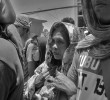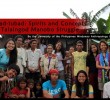By AMIRA ALI LIDASAN
Davao Today
For those of you who still haven’t watched the indie film “Thy Womb,” you can come to Zamboanga City and still catch it. Viewers in Manila were complaining last month that they had to comb the metro to find Brillante Mendoza’s movie about a Moro woman from Tawi-Tawi who helped her husband find another wife so that the latter could bear him a child. Filipino viewers are so loyal to Nora Aunor, who plays the female lead character; most of them tried hard to try to stop the film from being pulled out from major cinemas, despite hardly understanding (and accepting) the movie’s theme.
Friends who got to see the film would discuss to me more about La Aunor’s superb acting, the script’s use of the local dialect (Tausug/Sama) and the life of the people of Tawi-Taw,i and the movie’s technicalities. There was not much buzz about the movie’s central theme: a woman’s place in a feudal Muslim/Moro community.
Aunor portrayed Shaleha, a Tausug/Sama midwife who struggles to cope with infertility and therefore resorts to keeping as a token the umbilical cords of each of the babies of her patrons. Shaleha’s husband, played by Bembol Roco, is wounded after an attack by local pirates, prodding the couple to consider adopting a son. But Bangas-an, Roco’s character, decided that it’s time he should have a son by remarrying.
So Aunor’s Shaleha helped looked for her husband’s kah-luwa or (another wife), and in the process patronized by fellow women for her strength in carrying the task. She had to, she said, lest her husband fool around and leaves her. So she went out of her way to find a kahluwa, acquiesced to her husband’s decision to sell their boat’s motor, and saved the proceeds for the dowry. In the end, he did seem to leave her. For when Lovi Poe’s character accepted Bangas-an’s marriage proposal, there was a condition – that he leave Shaleha once she gives birth to his child.
It’s a breather that director Mendoza and screenwriter Henry Burgos helmed “Thy Womb.” For years, we have been treated to many movies tolerating concubinage and glamorizing mistresses. In “Thy Womb,” despite the legality of bigamy or polygamy in Islamic Law and accepted by the Moro community, Mendoza and writer Henry Burgos challenged the viewers to think of a happy ending for Aunor’s Shaleha. It would be wishful thinking that the flight of the flock of seagulls in the end represented freedom for Shaleha, because looking at Aunor’s eyes, it conveyed all the sadness and feeling of being left out.
So what is a woman’s worth in the Sama/Tausug community and in an Islamic society?
Lovi Poe’s character Mersila knew her worth – from the dowry to her place in the spouse’s life because of her capability to give birth. Mersila belongs to a family of means, educated, and therefore, could demand change in the Bangas-an’s family. Shaleha had only the strength, more than a decade of partnership, fealty and love. Inequality permeated in her marriage, as in the whole society.
I long for the day that true love will mean not being weighed by economic security, as what Friedrich Engels envisioned should our community become equal.
The situation in “Thy Womb” presents a situation to ponder for those who actively support the creation of a new Bangsamoro Autonomous Government. What will be the impact of the new autonomous entity to the lives of Moro women?
Taking cue from the movie, Moro women’s rights are restricted by their community and entrapped by their clan’s interpretation of the religion and tradition. While we are awed by the trappings of a new economic entity and all the legalities that probably only those exposed in Malaysia or European governments could understand, we should also know how to address the situations of the people in the grassroots.
In the crafting of the Bangsamoro Basic Law which will create the Bangsamoro Autonomous Government, women are being considered to have a place in the Bangsamoro Transition Commission. President Benigno S. Aquino III has already issued Executive Order No. 120 creating the Transition Commission and is already scouting for members.
Moro women delegates to the Transition Commission will be challenged at presenting the basic problems of Moro women—problems that could not be presented by the elite sectors of the Moro society, some of them women from rich families.
As a marginalized sector, we should be mindful of the predominantly poor Moro women who don’t have a voice in the forums and consultations – Moro women who are largely living on farming and fishing and vending. We should give voice to their situations and needs, prioritize solving their political and economic problems.
The other challenge is to not be trapped by the very same laws that they have crafted. I have heard testimonies of Muslim women activists in other countries who fought alongside the men in their nationalist aspirations, but in the end deprived the women – mostly coming from the impoverished sector – of a place in the making of a republic.
In the tradition of the Moro women who fought alongside men in the battlefield since colonial times to Martial Law regime, Moro women should not forget their part in pushing for changes for a progressive society; they cannot become party to its retrogression.
The impression left on me by the movie “Thy Womb” is disconcerting – it’s as if there’s nothing one can do. If it had been written and directed by Lino Brocka or any activist film makers, you would know that there will be a resolution in the end. Brocka’s women will not just cry in one corner or stare at birds in the sky, they will fight. Indeed, they will relieve themselves from their sorry condition.
Amira Ali Lidasan is an Iranun and hails from a prominent Moro clan in Maguindanao. She is an observer of Moro politics and an activist. Write to Amira at amirah.lidasan@gmail.com
brilliante mendoza, metro manila film festival, muslim women, nora aunor, thy womb
![[STANDPOINT] Illegal drugs and the NIMBY mindset](https://davaotoday.com/wp-content/uploads/2016/09/Mags-Maglana_UPMIN-Sept.-20-110x100.jpg)








